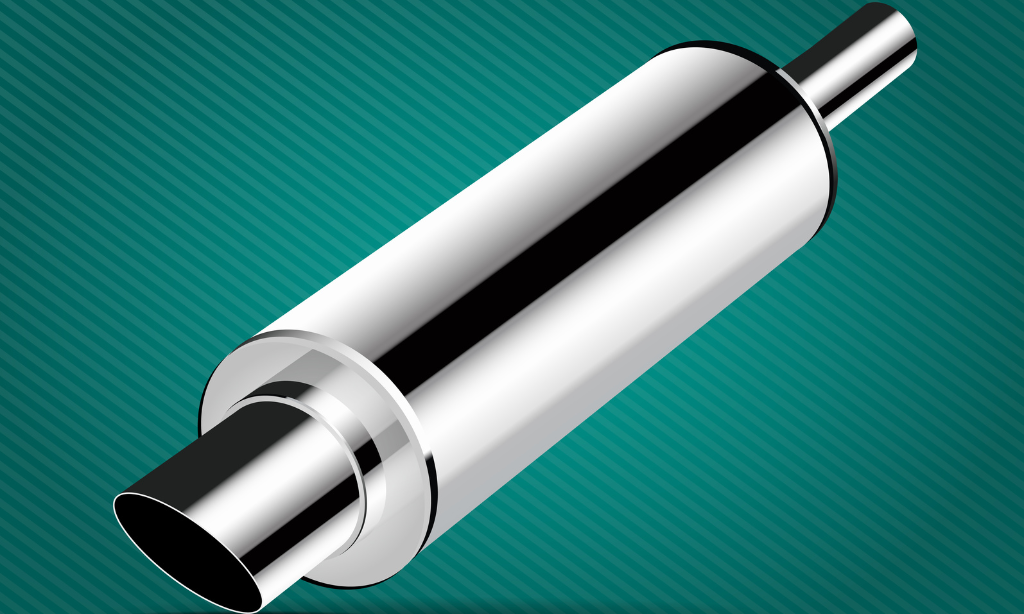Muffler Delete vs Resonator Delete (Comparison Guide 2024)
Muffler delete and resonator delete are two different modifications for a vehicle’s exhaust system. Muffler delete removes the muffler, while resonator delete removes the resonator.
Each has its own set of pros and cons that drivers should consider before deciding which one to undertake. Both modifications can increase the sound of the exhaust, but a muffler delete tends to make the sound much louder and more aggressive, while a resonator delete offers a slightly deeper tone.
Additionally, a muffler delete can provide a small increase in horsepower, while a resonator delete may help improve exhaust flow. However, it’s important to note that both modifications can result in a loss of backpressure, which may affect overall engine performance. Overall, drivers should carefully weigh the pros and cons and consider their desired sound and performance outcomes before making a decision.
Muffler Delete: Unleash The Power
Are you looking to enhance the performance and sound of your vehicle’s exhaust system? A muffler delete might be just what you need. By removing the muffler from your exhaust system, you can unleash the true power of your engine.
However, before you decide to go for a muffler delete, it’s essential to understand the pros and cons. Let’s explore the benefits and potential drawbacks of a muffler delete.
Increased Horsepower: How Muffler Delete Enhances Engine Performance
Removing the muffler can have a significant impact on your vehicle’s horsepower. Here’s why a muffler delete can enhance engine performance:
- Eliminates exhaust backpressure: The muffler restricts the flow of exhaust gases, leading to increased backpressure. By removing the muffler, you allow the exhaust gases to exit without any obstructions, resulting in improved horsepower.
- Enhanced airflow: Without a muffler in the system, the exhaust gases can flow more freely, allowing the engine to breathe better. This improved airflow can contribute to an increase in horsepower.
- Potential for engine tuning: A muffler delete often goes hand-in-hand with engine tuning. When combined, they can optimize your vehicle’s performance by adjusting the fuel-to-air ratio and ignition timing.
Aggressive Exhaust Note: The Thrilling Sound That Comes With A Muffler Delete
One of the most enticing reasons car enthusiasts opt for a muffler delete is the aggressive exhaust note. Here’s why a muffler delete delivers a thrilling sound:
- Unleashing the true sound of the engine: The muffler plays a significant role in reducing the noise produced by the engine exhaust. Removing it allows the exhaust gases to escape unobstructed, resulting in a raw, deep, and aggressive sound.
- Enhanced sporty appeal: If you’re passionate about the sporty aesthetic, a muffler delete can provide your vehicle with an aggressive appearance. The sight of dual exhaust tips or a customized exhaust system hints at the power lurking under the hood.
- Personalization and uniqueness: A muffler delete allows you to tailor the sound of your vehicle to your preferences. You have the freedom to choose the tone, volume, and character of your exhaust note, setting your car apart from the rest.
Potential Legal Issues: The Legality Of Muffler Delete And Potential Consequences
While a muffler delete may seem like a tempting modification, it’s essential to be aware of the potential legal issues associated with it:
- Noise regulations: Most regions have noise regulations in place to prevent excessive vehicle noise pollution. A muffler delete can significantly increase the sound level of your vehicle, potentially violating these noise limits.
- Fines and penalties: If you’re caught driving a vehicle with an excessively loud exhaust due to a muffler delete, you may face fines, penalties, or even vehicle impoundment. It’s crucial to familiarize yourself with local laws and regulations before proceeding with a muffler delete.
Impact On Fuel Efficiency: Examining How Removing The Muffler Affects Gas Mileage
While a muffler delete can unlock more power and deliver an exhilarating sound, it’s important to consider its potential impact on fuel efficiency:
- Increased fuel consumption: The removal of the muffler alters the backpressure in the exhaust system, which can lead to changes in the fuel-to-air ratio. In some cases, this alteration may result in increased fuel consumption.
- Engine tuning considerations: To optimize fuel efficiency, it’s recommended to pair a muffler delete with engine tuning. This ensures that the fuel-to-air ratio is properly adjusted to maintain optimal efficiency while still benefiting from the increased airflow.
Factory Warranty Considerations: How A Muffler Delete May Invalidate Your Warranty
Before proceeding with a muffler delete, it’s crucial to understand its potential implications on your vehicle’s factory warranty:
- Warranty voiding: Modifying the exhaust system, including removing the muffler, can potentially void your vehicle’s warranty. Manufacturers may consider such modifications as an alteration to the original design, thereby absolving them of any responsibility for related issues.
- Aftermarket warranty options: If preserving your factory warranty is a concern, exploring aftermarket warranty providers who offer coverage for modified vehicles may be a viable solution. These providers specialize in covering vehicles with aftermarket modifications, including muffler deletes.
A muffler delete offers the potential for increased horsepower, an aggressive exhaust note, and personalized customization. However, it’s crucial to understand and consider the potential legal issues, impact on fuel efficiency, and warranty implications before making this modification to your vehicle.
It’s always advisable to consult with professionals and understand your local regulations to make an informed decision that aligns with your priorities.
Resonator Delete: Tuning The Tone
If you’re a car enthusiast looking to enhance the sound of your vehicle, a resonator delete might be on your radar. By removing the resonator from your exhaust system, you can achieve a much louder and aggressive tone. However, before you make any modifications, it’s important to understand the pros and cons of a resonator delete.
In this section, we’ll explore the key aspects of a resonator delete and how it can impact your driving experience.
Improved Sound Quality: How Resonator Delete Can Enhance The Overall Audio Experience
- By eliminating the resonator, you can significantly amplify the exhaust note of your vehicle. This modification allows the engine’s true sound to come to life, resulting in a more aggressive and sporty tone.
- The resonator delete provides a deeper and throatier sound, adding a sense of character to your car’s audio output.
- The removal of the resonator can enhance the overall driving experience, making it more exhilarating and satisfying for enthusiasts who appreciate a robust exhaust sound.
Minimal Power Gains: Analyzing The Impact Of Resonator Delete On Horsepower
- While a resonator delete can improve the sound quality of your vehicle, it’s important to note that it won’t necessarily lead to significant power gains.
- The primary function of a resonator is to reduce exhaust noise, not to increase performance. Therefore, removing it may not result in a noticeable increase in horsepower.
- It’s crucial to set realistic expectations when it comes to performance gains. If your main goal is to enhance the power output of your vehicle, there may be other modifications that could provide more substantial results.
Avoiding Legal Trouble: Is Resonator Delete A Safer Option From A Legal Standpoint?
- Before you proceed with a resonator delete, it’s essential to familiarize yourself with local regulations and laws regarding vehicle modifications.
- In some jurisdictions, removing the resonator may violate noise regulations, leading to potential legal consequences.
- Additionally, keep in mind that modifying your vehicle’s exhaust system can also void certain warranties. It’s crucial to consider both the legal implications and potential warranty issues before making any modifications.
Impact On Fuel Economy: Does Removing The Resonator Affect Gas Mileage?
- While a resonator delete may result in a more exhilarating driving experience, it’s important to consider the potential impact on fuel economy.
- In general, removing the resonator alone is unlikely to have a significant effect on gas mileage. However, it’s crucial to remember that modifying other components of the exhaust system may lead to changes in fuel efficiency.
- If you’re concerned about maintaining optimal fuel economy, it’s recommended to consult with a qualified mechanic or automotive expert before making any modifications.
Warranty Implications: Understanding The Potential Warranty Issues With A Resonator Delete
- Modifying your vehicle’s exhaust system, including removing the resonator, can potentially void the manufacturer’s warranty.
- Before making any modifications, it’s crucial to carefully review your vehicle’s warranty documentation and understand the implications of aftermarket modifications.
- Certain manufacturers may offer performance-oriented exhaust systems as optional upgrades that won’t compromise your warranty. Exploring these options could be a viable solution if you’re concerned about warranty issues.
A resonator delete can provide a significant improvement in sound quality, allowing you to achieve a more aggressive and sporty exhaust note. However, it’s important to weigh the benefits against the potential downsides, including minimal power gains, potential legality issues, potential impact on fuel economy, and warranty implications.
Ultimately, making an informed decision based on your specific needs and preferences will ensure a satisfying driving experience without any regrets.
The Showdown: Muffler Delete Vs Resonator Delete
When it comes to modifying your vehicle’s exhaust system, muffler delete and resonator delete are two popular options. Both modifications can enhance the sound and performance of your car, but they have their own pros and cons. In this section, we will compare muffler delete and resonator delete in terms of sound, performance, legal considerations, fuel efficiency, and warranty implications.
Sound Comparison: A Head-To-Head Analysis Of The Sound Differences Between The Two Modifications
Both muffler delete and resonator delete can result in a louder exhaust note, but there are distinct differences in the sound produced:
- Muffler delete:
- Provides a deep and aggressive rumble.
- Amplifies the engine noise significantly.
- Can be excessively loud and may produce a grating sound at high rpms.
- Resonator delete:
- Offers a slightly louder exhaust sound.
- Tends to produce a cleaner and smoother tone.
- Minimizes the chances of droning or resonance inside the cabin.
Performance Comparison: Evaluating The Power Gains Offered By Muffler Delete And Resonator Delete
Both muffler delete and resonator delete can potentially boost the performance of your vehicle, but the extent of the power gains may vary:
- Muffler delete:
- Improves exhaust flow by eliminating the restriction caused by the muffler.
- Increases horsepower and torque to a noticeable extent.
- Enhances throttle response and overall engine performance.
- Resonator delete:
- Improves exhaust flow by eliminating the restrictions caused by the resonator.
- Offers a relatively smaller increase in horsepower and torque compared to muffler delete.
- May provide a more responsive acceleration.
Legal Considerations: Weighing The Legal Implications And Potential Penalties For Both Modifications
Before considering muffler delete or resonator delete, it’s important to understand the legal implications:
- Muffler delete:
- Often considered illegal due to the removal of the muffler, which violates noise pollution regulations.
- Can lead to fines and citations if caught by law enforcement.
- The legality varies by state and country, so it’s crucial to research local regulations.
- Resonator delete:
- Generally considered legal as it doesn’t remove the entire exhaust system.
- Still, it’s important to check local noise regulations to ensure compliance.
- Some states may have specific laws regarding the removal of any emissions-related components.
Fuel Efficiency Comparison: Examining The Impact Of Each Modification On Gas Mileage
Both muffler delete and resonator delete can potentially affect fuel efficiency:
- Muffler delete:
- May cause a slight decrease in fuel efficiency due to increased exhaust flow and altered backpressure.
- The impact on mileage varies depending on driving habits and vehicle characteristics.
- Some users report a negligible difference in fuel consumption, while others notice a small decrease.
- Resonator delete:
- Can have a minimal impact on fuel efficiency, if any.
- Since the resonator primarily reduces noise, removing it may not significantly impact exhaust flow and backpressure.
- However, individual results may vary depending on the vehicle’s make and model.
Warranty Comparison: Understanding How Muffler Delete And Resonator Delete May Affect Your Vehicle’S Warranty
Modifying your exhaust system can potentially impact your vehicle’s warranty coverage:
- Muffler delete:
- Generally, removing the muffler may void the warranty for the exhaust system.
- It’s crucial to check your vehicle’s warranty terms and conditions.
- Some manufacturers may offer performance-oriented options or aftermarket exhaust systems that maintain warranty coverage.
- Resonator delete:
- Removing the resonator typically doesn’t void the warranty for the exhaust system.
- However, altering any emissions-related components might affect the warranty coverage.
- It’s essential to review the warranty documentation or consult with your dealership before making any modifications.
Muffler delete and resonator delete offer different sound profiles, performance gains, legal considerations, fuel efficiency impacts, and warranty implications. Understanding the pros and cons of each modification will help you make an informed decision based on your preferences and priorities.
Remember to comply with local laws and consider the potential consequences before making any changes to your vehicle’s exhaust system.
Conclusion
To wrap up, both muffler delete and resonator delete offer their own advantages and disadvantages. The decision ultimately depends on your personal preferences and goals for your vehicle. Muffler delete provides a louder and more aggressive exhaust sound, ensuring you stand out on the road.
On the other hand, a resonator delete improves exhaust flow and can enhance performance. However, it may also result in a louder interior cabin noise. It is crucial to consider local regulations and emissions laws before making any modifications to your exhaust system.
Consulting with professionals who specialize in vehicle modifications can also provide valuable insights and guidance. Remember, altering your exhaust system can affect the overall driving experience, so it’s essential to choose wisely based on your desired outcome. Ultimately, the choice between muffler delete and resonator delete boils down to finding the perfect balance between sound, performance, and compliance with regulations.
- How to Install a Toolbox in a Truck Bed Without Drilling: A Practical Guide - March 12, 2024
- Pros and Cons of Working at a Gas Station (Everyone Should Know) - March 12, 2024
- What Happens When Cam Phasers Go Bad? (With Solved) - March 12, 2024




![What Is Overdrive on A Car? [Quick Guide 2024]](https://automhelp.com/wp-content/uploads/2023/12/Every-Time-@ZacAlsop-is-SLOWER-We-UPGRADE-His-Car_000001577-768x432.webp)
![Car Running Rich? [Ultimate Guide & Fix Issue]](https://automhelp.com/wp-content/uploads/2023/07/Car-Running-Rich-768x461.png)

